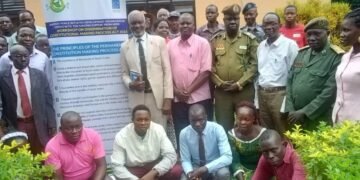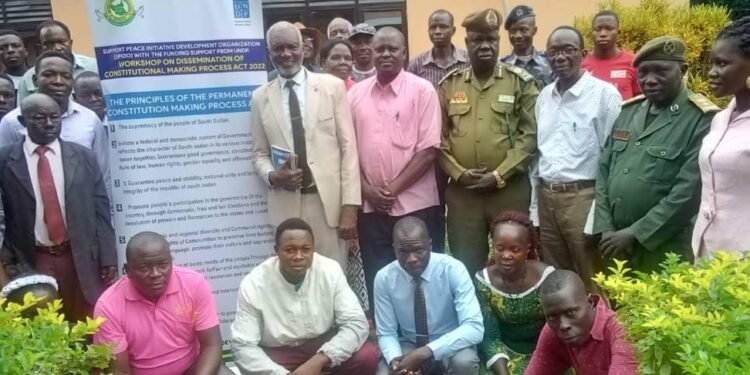Leaders, civil society, and citizens in Yambio County have called for greater public participation in South Sudan’s permanent constitution-making process,
The stakeholders warned that the future of democracy, elections, and governance depends on it.
The message came during the launch of a new phase of the constitution project by SPIDO Organization, supported by UNDP, where participants emphasized unity, accountability, and grassroots involvement.
Mr. Morris John the project officer for SPIDO, said citizens must not remain silent spectators while key national processes unfold.
“If I was to ask you how far the constitutional process has gone, many may not know. Yet it is a very important document we are supposed to follow from the state up to the national government,” Morris said.
He stressed that the National Constitutional Review Commission (NCRC) is struggling due to funding delays, urging both citizens and state leaders to push the national parliament to release the approved budget.
“Let’s not say this is the constitution of the government or of an individual. At the end of the day, we must be proud that we participated, because our children and grandchildren will remember us as part of this history,” he added.
Western Equatoria State Acting Governor, Hon. John Bariona Farula, reminded citizens that laws only work when respected and upheld.
“There is no good law and no bad law. It is the people who make the law useful or useless. Even animals have laws when a dog enters another dog’s yard, it lowers its tail in respect. If animals can respect their laws, what about us?” he asked.
He warned that nepotism and corruption are the greatest threats to justice.
“Nepotism will bring corruption, corruption will bring tribalism, and tribalism will bring lawlessness,” Farulacautioned.
On behalf of Yambio County citizens, the Executive Director welcomed SPIDO’s initiative but raised concerns about a looming civic education crisis to the citizens.
“Our community are at risk, due to lack of financial liquidity for civic education about NCRC, local councils were expected to conduct civic education, but many have failed to fulfill their duties,” he said,
calling for urgent cooperation to secure future.
Jimmy Albert, a Yambio resident living with a disability, called for the constitution to safeguard rights for all.
“Too often, people with disabilities are forgotten in national processes. This constitution must guarantee equality before the law for every South Sudanese,” Jimmy said.
The permanent constitution is one of the pillars of the 2018 Revitalized Peace Agreement (R-ARCSS). Its completion will determine how elections are conducted, how power is shared, and how rights are protected.
The NCRC, established in November 2023, has already rolled out civic education and is expected to launch consultations in Eastern Equatoria and Pibor in September, with Western Equatoria scheduled for October. However, lack of funds has slowed progress.
Observers say the difference between the new permanent constitution and previous charters is that this one is meant to be people-driven, not drafted solely by political elites.
The mood in Yambio was clear: citizens, leaders, and civil society all want to see the process succeed. But asone participant summed it up it will only succeed if the people themselves claim ownership.
“This is not the constitution of Juba, nor of one group. It is our constitution and it is our duty to shape it, respect it, and pass it on to future generations,” a community member said.












